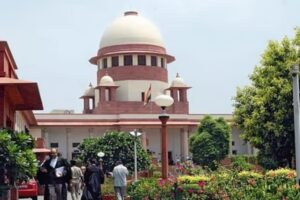
The Supreme Court on Monday has declined to entertain a plea challenging the exclusion of penal provisions for unnatural sex and sodomy from the Bharatiya Nyay Sanhita, which has replaced the Indian Penal Code.
A bench led by Chief Justice D. Y. Chandrachud, along with Justices J. B. Pardiwala and Manoj Misra, stated that the matter falls within the parliamentary domain, asserting that the court cannot compel Parliament to introduce new laws. “We can’t create an offence… This court under Article 142 cannot direct that a particular act constitutes an offence. Such exercises fall under parliamentary domain,” the bench explained. They allowed the petitioner, Pooja Sharma, to approach the government with a representation on the issue instead.
Previously, Section 377 of the IPC penalized non-consensual “unnatural sex” between adults, as well as sexual activities involving minors and bestiality. However, on September 6, 2018, the Supreme Court decriminalized same-sex relationships between consenting adults, marking a significant legal shift.
The BNS, which officially replaced the IPC, came into effect on July 1, 2024. The plea brought before the court highlighted an “exigent legal lacuna” created by the enactment of the BNS. Sharma argued that the omission by the authorities leaves victims of non-consensual unnatural sex without any legal remedies that reflect the seriousness of the offenses previously defined under Section 377 of the IPC.
In August 2024, the Delhi High Court had urged the Centre to clarify its stance on the exclusion of penal provisions for unnatural sex and sodomy from the new BNS. The court emphasized that the legislature must address the issue of non-consensual unnatural sex.
This legal development underscores the complexities involved in the transition from the IPC to the BNS and raises concerns about the protection of victims in the absence of adequate legal provisions. As the matter unfolds, it highlights the ongoing debates surrounding sexual offenses, legal definitions, and the importance of ensuring that victims have access to appropriate legal recourse.
The Supreme Court’s refusal to intervene directly reaffirms the principle of separation of powers, emphasizing that it is ultimately up to the legislature to address these pressing legal issues. As stakeholders await government action, the implications for victims and legal protections remain a significant concern in the evolving legal landscape.




